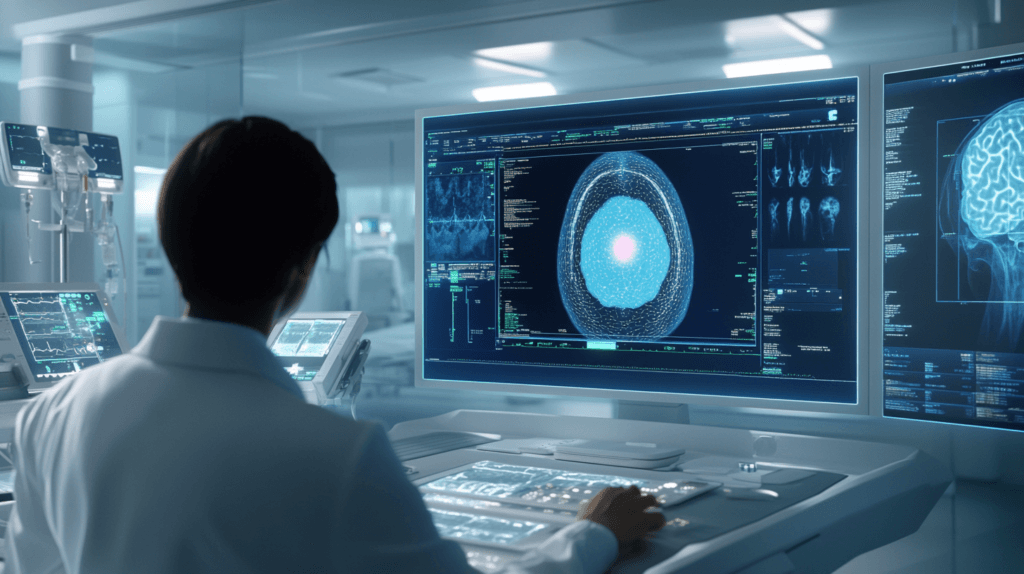The AI Revolution in Healthcare: How Artificial Intelligence is Transforming Patient Care and Medical Research
Artificial intelligence (AI) is rapidly changing the world around us, and healthcare is no exception. From diagnosing diseases to developing new treatments, AI is revolutionizing how we approach patient care and medical research. This article delves into the ways AI is transforming healthcare, exploring its applications, benefits, and the challenges that lie ahead.
AI in Diagnosis: Enhancing Accuracy and Speed
One of the most promising applications of AI in healthcare is in the field of diagnostics. AI algorithms can analyze medical images, such as X-rays, MRIs, and CT scans, with remarkable accuracy, often surpassing human capabilities in detecting subtle abnormalities. This can lead to earlier and more accurate diagnoses, which are crucial for effective treatment.
- Image analysis: AI can identify tumors, fractures, and other anomalies in medical images, helping radiologists and other specialists prioritize urgent cases and improve diagnostic accuracy.
- Symptom checking: AI-powered chatbots and apps can assess patient symptoms, provide preliminary diagnoses, and recommend appropriate next steps, such as visiting a doctor or seeking emergency care.

AI in Treatment: Personalizing Care and Improving Outcomes
AI is also transforming how we treat diseases, enabling personalized medicine and improving patient outcomes. By analyzing vast amounts of data, AI algorithms can identify patterns and predict how patients will respond to different treatments.
- Personalized medicine: AI can analyze a patient’s genetic makeup, lifestyle, and medical history to predict their risk of developing certain diseases and recommend personalized preventive measures.
- Drug discovery and development: AI can accelerate the process of developing new drugs and therapies by identifying promising drug candidates and predicting their effectiveness.
- Robotics and surgery: AI-powered robots can assist surgeons with complex procedures, improving precision and reducing invasiveness.
AI in Medical Research: Accelerating Discovery and Innovation
AI is a powerful tool for medical research, enabling scientists to analyze vast datasets and identify patterns that would be impossible to detect manually. This can lead to new discoveries and accelerate the development of innovative treatments.
- Data analysis: AI can analyze large datasets of patient information, clinical trial results, and scientific literature to identify trends and insights that can inform research.
- Predictive modeling: AI can predict the progression of diseases and identify individuals at high risk, allowing for early intervention and preventive measures.
- Clinical trial design: AI can optimize the design of clinical trials, improving efficiency and reducing costs.
Benefits of AI in Healthcare
The integration of AI in healthcare offers numerous benefits:
- Improved accuracy and speed of diagnosis
- Personalized treatment plans
- Faster drug discovery and development
- Increased efficiency and reduced costs
- Improved patient outcomes
- Enhanced access to care
Challenges and Ethical Considerations
While the potential of AI in healthcare is immense, there are also challenges and ethical considerations that need to be addressed:
- Data privacy and security: Protecting patient data is crucial, and AI systems must be designed with robust security measures.
- Bias and fairness: AI algorithms can perpetuate existing biases in healthcare if they are trained on biased data.
- Transparency and explainability: It is important to understand how AI algorithms arrive at their conclusions, especially in critical areas like diagnosis and treatment.
- Regulation and oversight: Appropriate regulations are needed to ensure the safe and ethical use of AI in healthcare.

The Future of AI in Healthcare
AI is poised to revolutionize healthcare in the years to come. As technology continues to advance and more data becomes available, we can expect to see even more innovative applications of AI in diagnosis, treatment, and medical research.
- AI-powered virtual assistants: Providing patients with personalized health information and support.
- Wearable AI devices: Monitoring patient health and providing real-time feedback.
- AI-driven predictive analytics: Forecasting disease outbreaks and public health trends.
By embracing AI and addressing the associated challenges, we can unlock its full potential to transform healthcare and improve the lives of patients worldwide.




No Comment! Be the first one.